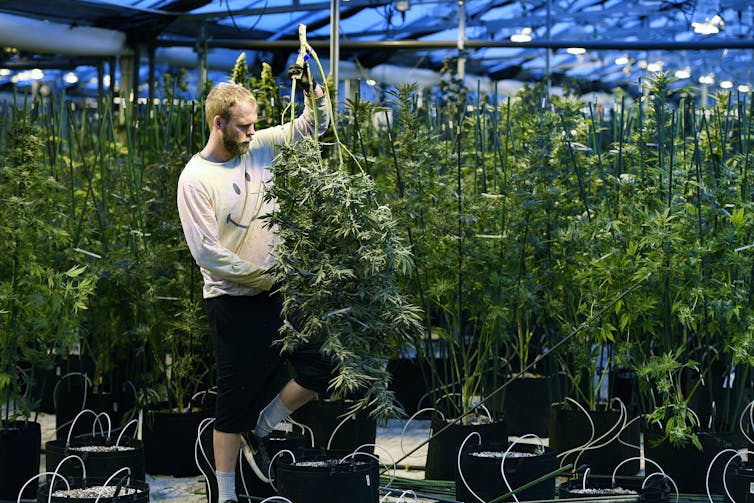
By Boyoung Seo
The U.S. Drug Enforcement Administration has made moves to reclassify marijuana, making it a type of legal but regulated medicine, like Tylenol with codeine or some steroids.
With the reclassification, 26 states where cannabis is currently illegal will need to decide whether they want to take action to stop the sale of cannabis in their state or figure out how to regulate the newly legal drug.
A few states such as North Carolina have laws on the books saying cannabis will automatically become legal once the federal change goes into effect.
But the regulation of cannabis is nothing new in Colorado and Washington. These two states have more than a decade of experience writing and enforcing laws to control the marijuana marketplace.
I’m an economist who specializes in forecasting how various regulations affect industries such as legal recreational marijuana, alcohol and tobacco. Let’s take a look at how Colorado and Washington approached the problem – and what other states can learn from their experience.
Early adopters
In 2012, Colorado and Washington became the first two states to legalize marijuana, but their regulatory approaches were different.
Colorado implemented laws more favorable to competition by allowing unlimited marijuana retailers. Competitive markets with many businesses are generally believed by economists to be better for consumers because they lower prices and increase the quality of the goods and services offered.
Washington took a different approach by limiting the number of retailers and restricting competition, an approach designed to maintain higher prices to deter overconsumption. Too much cannabis use can lead to burdens on society, such as increased health care costs and negative affects on adolescents, so legislators may have been motivated to curb it.
At first glance, you’d expect Colorado’s laws to lead to significantly lower marijuana retail prices. But during 2022, average marijuana prices were actually slightly higher in Colorado than in Washington. Regulations in each state have changed only modestly since 2012. So why didn’t Colorado’s freer marketplace lead to lower prices, as an economist would expect?
Limited versus unlimited retail licenses
I believe the explanation lies in three important ways the policies of the two states diverge: the cap on total number of licenses allowed by each state, how big a company can be, and vertical integration. In the case of marijuana sales, vertical integration means that the same business may own farms, distributors and retailers.
When Colorado first legalized recreational marijuana, it allowed unlimited cannabis licenses for growers, distributors and retailers. This fostered an environment of intense competition.
In contrast, Washington capped retail licenses at 334, or 4.8 dispensaries per 100,000 people, setting up conditions for a concentrated market that would potentially lead to higher markups and retail prices. In 2016, Washington increased that cap to 556 to incorporate medical dispensaries. As of March 2024, only 469 of those licenses were being used.
In comparison, Colorado has 680 retail licenses, or about 14 dispensaries per 100,000 people, roughly three times the number in Washington per capita.
Based just on the number of retail licenses, Colorado’s marijuana industry looks more competitive than Washington’s, but the second policy difference – how big companies can be – complicates that picture.

Helen H. Richardson/The Denver Post via Getty Images
A David vs. Goliath market
Washington regulates the number of marijuana licenses per business, making its market more favorable to many small businesses, while Colorado’s regulatory environment is friendlier to big chain companies.
Washington will allow each recreational marijuana business to own only five dispensaries, three growers and three processors. A processor converts raw materials into usable products and sells to dispensaries or to other processors.
On average, one Washington marijuana business owns 1.24 licenses. That’s in stark contrast to Colorado, where on average one business owns 9.6.
Giant marijuana companies have not been attracted to Washington’s marijuana marketplace. But it is a very different story in Colorado.
For instance, marijuana chain company LivWell currently has 24 active recreational marijuana retail licenses in 14 Colorado cities. It also has two cultivation sites in Denver.
Large chain marijuana companies such as LivWell and Native Roots are prevalent in Colorado, but the regulatory environment makes it hard for small independent producers and dispensaries to survive. Even though Colorado makes seven times more licenses than Washington available for businesses to grow, distribute and sell marijuana, they’re owned by far fewer companies. This results in a less competitive marijuana market with higher prices.
State differences in vertical integration
Finally, both states implemented different restrictions on what economists call vertical integration.
To understand vertical integration, think about the cellphone industry. Apple and Samsung are vertically integrated companies, meaning they manufacture their products, distribute them and sell them at their own stores.
By comparison, brewers operate in a very different regulatory environment. Anheuser-Busch, which brews Budweiser, cannot distribute the beer or sell it directly to consumers by law. Instead, it must follow the three-tier system that controls the alcohol industry, meaning it can sell only to wholesale distributors. Many communities make an exception for craft breweries, which can sell directly to consumers with some restrictions.
When vertical integration is allowed in the marijuana industry, growers are permitted to also be processors and to run marijuana dispensaries. Colorado’s original legislation took this a step further by actually requiring all marijuana retailers to be vertically integrated for the first nine months they were in business. That meant all licensed retailers had to grow at least 70% of the marijuana they sold.
The motivation for this was to prevent black market marijuana from leaking into the state’s legal market. If a dispensary sells out of its own marijuana, it cannot receive supplies that may come from the black market.
Colorado abandoned the requirement for vertical integration in 2018. Now companies can grow and sell to any retailer, but most still remain vertically integrated.
In contrast, Washington strictly prohibits vertical integration, applying a three-tier system like the one that governs the alcohol industry. This ensures the marijuana industry is tightly regulated.
Vertical integration most frequently leads to lower prices. Without vertical integration, the supplier imposes a markup when selling its products to a retailer, and the retailer imposes its own markup when selling products to consumers. In contrast, vertically integrated businesses mark up the product only once, saving money for the consumer.
But vertical integration can sometimes drive prices higher by making it harder for small, stand-alone companies to compete. This lack of competition makes the market more concentrated, leading to higher prices. In Colorado, the existence of many vertically integrated businesses immediately after legalization likely gave an advantage to only a few big players.
What lawmakers can do
Prices are affected by a complex interplay of competition, market concentration and vertical integration. So what’s a lawmaker to do?
States aiming to lower marijuana prices should look at promoting competition by approving more licenses, leaving business sizes restricted and allowing vertical integration.
States that want to limit consumption through higher prices could cap licenses, not restrict business sizes and prohibit vertical integration to create a more controlled market with fewer businesses.
![]()
Boyoung Seo is Assistant Professor of Business at Indiana University.





























Leave a Reply